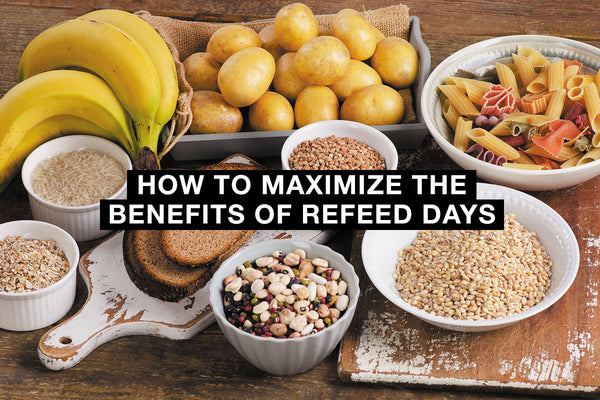Dieting can be pretty stressful at times.
Forcing yourself to be on lower calories (while also increasing levels of physical activity) is bound to leave you sore, tired, and grumpy.
Just as any physique athlete who’s dieted for months on end -- food cravings become so intense you actually start dreaming about food.
Fortunately, there is a tool you can use to help quell those cravings and keep you on track for success during your transformation challenge.
That tool is called a “refeed” and if you’re not familiar with the concept, then you’re in luck as we’re about to discuss what refeed days are, what benefits they provide, and how you can implement them into your nutrition plan for maximum benefit.
Let’s start by answering a simple question…
Are Cravings Normal?
100% yes!
Cravings are perfectly normal (and expected) when dieting for prolonged periods of time.
The more intense your diet, typically the more intense the cravings are, too.
Think of it like this -- the body craves homeostasis. It likes where it is, and it will resist drastic changes, such as losing body fat or building muscle (this is why you have to work so hard in the gym to force adaptation and muscle growth!).
As such, when you purposefully restrict calories and/or significantly increase physical activity levels, the body perceives it as a stress and will enact various countermeasures to avoid going into a calorie deficit (which would lead to weight loss).
Among these various “countermeasures” enacted by the body is an increase in hunger hormones like ghrelin.
As you start to lose weight, levels of leptin (the satiety hormone) decline. So, not only do you feel hungry more often, you’re also less satiated following mealtime.
If you spend any length of time dieting, you will face feelings of hunger and cravings for certain foods or beverages.
Fortunately, there is a tool you can use to help keep those cravings and hunger pangs in check -- refeeds!
What Are Refeed Days?
A refeed day is a planned increase in calories for one day to give your mind and body a break from the rigors of dieting.
Refeed days can be taken weekly or biweekly depending on the length of your diet and/or when you want to hit your goal weight.
The thinking behind a refeed day is that a short increase in calories will help to counteract the negative effects of dieting, which include:
- Decreased hormone production
- Lethargy
- Poor mood
- Hunger/Cravings
- Plateau in weight loss
Are Refeed Days and Cheat Days the Same Thing?
No, not entirely.
Refeed days are precise, planned days where you eat a specific number of calories and macronutrients. Typically, refeed days contain higher amounts of carbohydrates compared to regular diet days while protein and fat are held fairly constant.
Cheat meals are a single meal that you do not track and frankly have little to no regard for the calorie/macronutrient content.
As a side note, cheat meals should really be re-named to “free meals”. The reason for this is that “cheating” has a bad connotation. Cheating on your spouse, taxes, exams, etc. are not good things. Adopting the mindset that you’re “cheating” on your diet plants the seed that there are morally “good” and “bad” foods. Truth be told, there are foods that are more “healthy” than other foods, but no food is outright good or bad, in a moral sense.
Anyway…
Do Refeed Days Work?
Yes and no.
Refeed days are great for alleviating the mental burden of dieting, which may help you adhere to your diet for longer and get the results you want.
They can also help replenish glycogen stores so that recovery is accelerated and your performance the following day will be better.
However, refeed days do not “reset” your hormone levels as they were once believed to do. The reason for this is that human physiology isn’t quite that sensitive. You would need a prolonged diet break (~1-2 weeks or so eating at maintenance) for leptin and ghrelin levels to fully normalize.
What Are the Benefits of Refeed Days?
Alleviate Mental Fatigue
Dieting is stressful, both mentally and physically.
Having one day per week (or one day every other week) where you get to eat significantly more calories and carbohydrates can help break up the monotony and stress of following a low-calorie diet.
This ultimately helps you stick to your diet and reduces the likelihood of binging, which facilitates greater/faster weight loss and better results.
Improved Performance/Recovery
Carbohydrates are the primary fuel for intense exercise (resistance training, sprinting, HIIT, etc.).
Refeed days provide a surge in carbohydrate intake which helps replenish glycogen stores, improve muscle recovery, and prime your muscles for better performance since they’re fuel tanks are full!
How to Structure a Refeed Day
How a refeed day is structured (how many calories and carbs you eat) and how frequently you have them is highly individualistic.
If you’re someone who is very overweight and has not been dieting for very long, you do not need a refeed day.
If, however, you’ve been dieting for several months and are approaching very low levels of body fat, a refeed day may be very useful, if not necessary.[1,2]
As we alluded to above, the majority of your increased calorie intake will come from carbohydrates -- protein and fat intake will remain fairly consistent with what they are on normal dieting days.
Some of our favorite sources of carbohydrates to include on refeed days include:
- Russet (white) potatoes
- Sweet potatoes
- Pasta
- Bananas
- Cereal
- Oatmeal
- Bagels
- Sushi (high in carbs, contains lean proteins, and usually low in fat)
Takeaway
Refeed days can be a useful tool for individuals who have been dieting for weeks/months on end as a means to alleviate the physical and mental stress of dieting. They may also help improve recovery and subsequent performance in your workouts.
Frequency of refeed days depends on how long an individual has been dieting as well as their level of leanness. The longer you’ve been dieting and the leaner you are, the more frequently you may need to take a refeed day.
References
- Peos JJ, Norton LE, Helms ER, Galpin AJ, Fournier P. Intermittent Dieting: Theoretical Considerations for the Athlete. Sports (Basel). 2019;7(1):22. Published 2019 Jan 16. doi:10.3390/sports7010022
- Trexler ET, Smith-Ryan AE, Norton LE. Metabolic adaptation to weight loss: implications for the athlete. J Int Soc Sports Nutr. 2014;11(1):7. Published 2014 Feb 27. doi:10.1186/1550-2783-11-7






